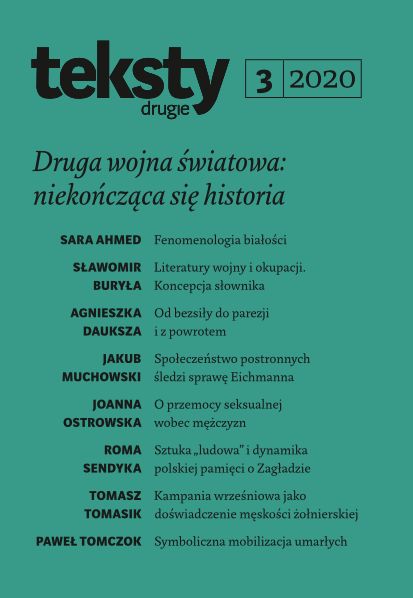Konzentrationslager Buchenwald, Post Weimar (w literaturze polskiej)
Konzentrationslager Buchenwald, Post Weimar (in Polish Literature)
Author(s): Arkadiusz MorawiecSubject(s): Polish Literature, Fascism, Nazism and WW II, Theory of Literature
Published by: Instytut Badań Literackich Polskiej Akademii Nauk
Keywords: Polish literature; concentration camp literature; Konzentrationslager Buchenwald;
Summary/Abstract: In the context of the Polish literature devoted to Nazi German concentration camps, the works dealing with the subject of Buchenwald are rather scarce. None of them are masterpieces or at least exceptional literary works. Some, however, are interesting cognitionor artistic-wise. The former include the prewar reportages by Stanisław Nogaj entitled Za drutami i kratami Trzeciej Rzeszy (Behind the fences and bars of the Third Reich) and the memoirs of Władysław Wójcik entitled Byłem w piekle… (I’ve been to hell…), overlooked by the researchers of the Nazi camps, and the poems written in Buchenwald, which are an interesting account in their own right. I would include among the latter the first edition of Bohdan Urbankowski’s poetry cycle Głosy (The Voices) and Piotr Matywiecki’s poem *** Wywleczeni na słońce… (*** Dragged into the sun). Situated between the two groups is Mieczysław Lurczyński’s revelatory – not just in the context of Polish literature – drama Stara Gwardia (The Old Guard), which depicts the so-called “grey zone” (to use the term of Primo Levi). The remaining works are interesting mostly as manifestation of ideological and political involvement (visible not just in the Polish People’s Republic period, although mostly then), as well as of collective and individual memory and sensitivity. As a literary theme, Buchenwald has not been and likely never will be able to “compete” with camps located in the Polish territories, especially with Auschwitz-Birkenau, which is a central symbol of Polish martyrology and of Shoah, also being, in the words of Imre Kertész, “a timeless tale marked with the stigma of non-transience”
Journal: Teksty Drugie
- Issue Year: 2020
- Issue No: 3
- Page Range: 198-212
- Page Count: 15
- Language: Polish
- Content File-PDF

